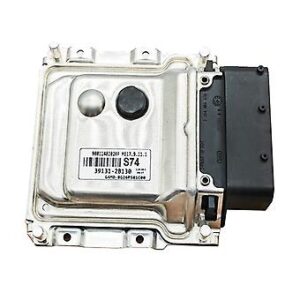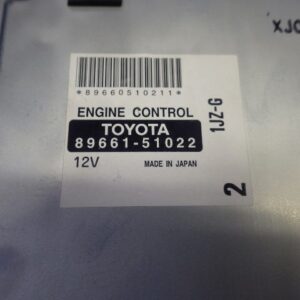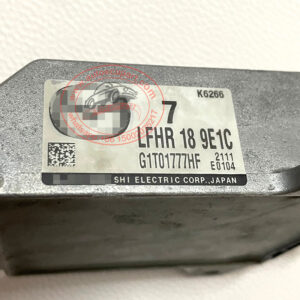Title: Unleashing the Power: Exploring the Engine Control Computer
Introduction:
In the heart of every modern vehicle lies a sophisticated network of electronic components that orchestrate the symphony of combustion and propulsion. At the center of this network is the engine control computer, a marvel of automotive engineering that holds the key to unlocking the full potential of your vehicle’s performance. In this blog, we’ll delve into the intricacies of the engine control computer, uncovering its function, importance, and how it revolutionizes the driving experience.
What is an Engine Control Computer?
The engine control computer, also known as the engine control module (ECM) or powertrain control module (PCM), is the brain of your vehicle’s engine management system. Housed within the engine compartment or cabin, this electronic control unit (ECU) is responsible for monitoring and controlling various engine functions to optimize performance, fuel efficiency, and emissions.
Functionality:
But how does the engine control computer work its magic? Through a network of sensors and actuators strategically placed throughout the engine and drivetrain, the ECM collects data on parameters such as engine speed, temperature, load, and exhaust emissions. Using this real-time data, the ECM calculates the optimal air-fuel mixture, ignition timing, and valve timing for efficient combustion and power delivery.
Importance:
The engine control computer plays a pivotal role in shaping the driving experience, influencing everything from acceleration and responsiveness to fuel economy and emissions control. By continuously monitoring and adjusting engine parameters, the ECM ensures that your vehicle operates at peak performance under various driving conditions, whether you’re cruising down the highway or navigating city streets.
Key Functions of the Engine Control Computer:
1. Fuel Injection Control: The ECM regulates fuel injection timing, duration, and quantity to maintain the ideal air-fuel ratio for combustion.
2. Ignition Timing Control: By adjusting ignition timing, the ECM optimizes engine performance, efficiency, and emissions control.
3. Idle Speed Control: The ECM regulates idle speed to ensure smooth and stable engine operation during idle conditions.
4. Emission Control: Through precise control of fuel delivery and combustion parameters, the ECM helps minimize harmful emissions and ensure compliance with emissions standards.
5. Diagnostic Functions: The ECM continuously monitors engine sensors and systems for faults or abnormalities, triggering warning lights or diagnostic trouble codes (DTCs) when necessary.
Maintenance and Repair:
Proper maintenance and care of the engine control computer are essential to ensure reliable performance and longevity. Routine inspection, cleaning, and testing of engine sensors, connectors, and wiring harnesses can help prevent potential issues or malfunctions. In the event of a malfunction or failure, professional diagnosis and repair by a qualified technician are recommended to address any underlying issues and restore proper function.
Conclusion:
In conclusion, the engine control computer is a technological marvel that serves as the nerve center of your vehicle’s engine management system. By monitoring and controlling various engine functions, the ECM optimizes performance, efficiency, and emissions control, shaping the driving experience in profound ways. So, the next time you hit the road, take a moment to appreciate the silent conductor orchestrating the symphony of combustion—the engine control computer.
Only 2 left in stock (can be backordered)
$192,386.44
Title: Unleashing the Power: Exploring the Engine Control Computer
Introduction:
In the heart of every modern vehicle lies a sophisticated network of electronic components that orchestrate the symphony of combustion and propulsion. At the center of this network is the engine control computer, a marvel of automotive engineering that holds the key to unlocking the full potential of your vehicle’s performance. In this blog, we’ll delve into the intricacies of the engine control computer, uncovering its function, importance, and how it revolutionizes the driving experience.
What is an Engine Control Computer?
The engine control computer, also known as the engine control module (ECM) or powertrain control module (PCM), is the brain of your vehicle’s engine management system. Housed within the engine compartment or cabin, this electronic control unit (ECU) is responsible for monitoring and controlling various engine functions to optimize performance, fuel efficiency, and emissions.
Functionality:
But how does the engine control computer work its magic? Through a network of sensors and actuators strategically placed throughout the engine and drivetrain, the ECM collects data on parameters such as engine speed, temperature, load, and exhaust emissions. Using this real-time data, the ECM calculates the optimal air-fuel mixture, ignition timing, and valve timing for efficient combustion and power delivery.
Importance:
The engine control computer plays a pivotal role in shaping the driving experience, influencing everything from acceleration and responsiveness to fuel economy and emissions control. By continuously monitoring and adjusting engine parameters, the ECM ensures that your vehicle operates at peak performance under various driving conditions, whether you’re cruising down the highway or navigating city streets.
Key Functions of the Engine Control Computer:
1. Fuel Injection Control: The ECM regulates fuel injection timing, duration, and quantity to maintain the ideal air-fuel ratio for combustion.
2. Ignition Timing Control: By adjusting ignition timing, the ECM optimizes engine performance, efficiency, and emissions control.
3. Idle Speed Control: The ECM regulates idle speed to ensure smooth and stable engine operation during idle conditions.
4. Emission Control: Through precise control of fuel delivery and combustion parameters, the ECM helps minimize harmful emissions and ensure compliance with emissions standards.
5. Diagnostic Functions: The ECM continuously monitors engine sensors and systems for faults or abnormalities, triggering warning lights or diagnostic trouble codes (DTCs) when necessary.
Maintenance and Repair:
Proper maintenance and care of the engine control computer are essential to ensure reliable performance and longevity. Routine inspection, cleaning, and testing of engine sensors, connectors, and wiring harnesses can help prevent potential issues or malfunctions. In the event of a malfunction or failure, professional diagnosis and repair by a qualified technician are recommended to address any underlying issues and restore proper function.
Conclusion:
In conclusion, the engine control computer is a technological marvel that serves as the nerve center of your vehicle’s engine management system. By monitoring and controlling various engine functions, the ECM optimizes performance, efficiency, and emissions control, shaping the driving experience in profound ways. So, the next time you hit the road, take a moment to appreciate the silent conductor orchestrating the symphony of combustion—the engine control computer.
| Warehouse | Inventory at warehouse 2 |
|---|




Get E-mail updates about our latest products and special offers.
Sensors and More is Jamaica’s ultimate online auto parts store. Established in 2020, we specialize in genuine electrical parts for Japanese, Read more…
Reviews
There are no reviews yet.